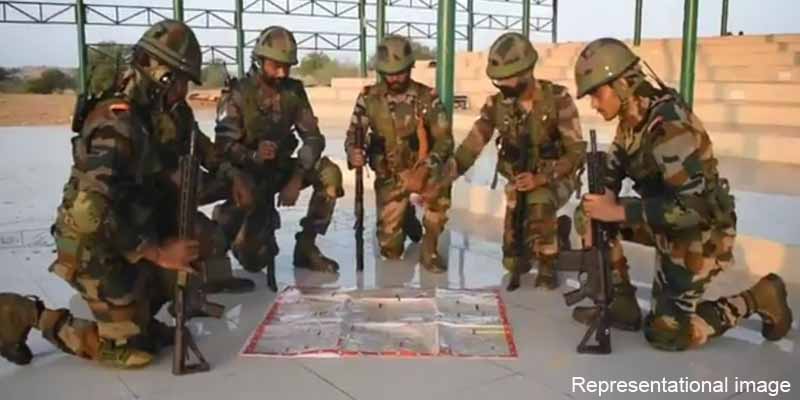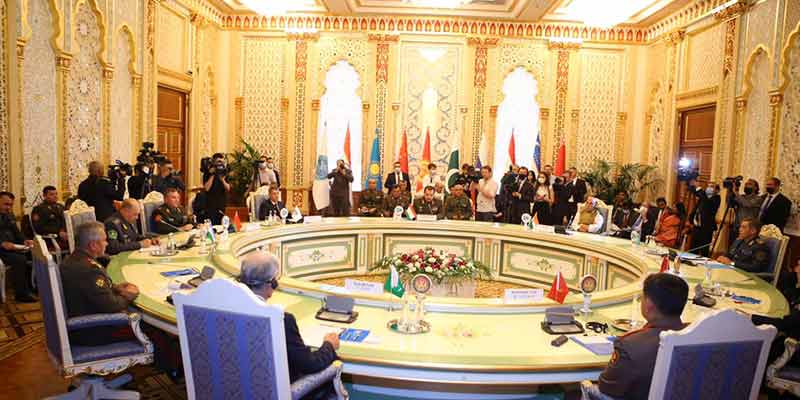- India
- Sep 15
India participates in SCO’s ‘Peaceful Mission’ exercise in Russia
• India has participated in a multi-nation joint counter-terror exercise in Russia’s Orenburg region.
• ‘Exercise Peaceful Mission’ is conducted biennially as part of military diplomacy by Shanghai Cooperation Organisation (SCO) member states.
• The SCO is an eight-member economic and security bloc and has emerged as one of the largest transregional international organisations.
• India has sent a team of 200 personnel for the sixth edition of the exercise from September 13 to 25.
Key points:
• The aim of the exercise is to foster close relations between SCO member states and to enhance the abilities of the military leaders to command multi-nation military contingents.
• The Indian military contingent comprises an all arms combined force of 200 personnel including 38 personnel from the Indian Air Force.
• The exercise is described as a landmark event in military interactions and global cooperation to counter-terrorism.
• The exercise will enable sharing of best practices between the armed forces of the SCO nations.
• It will also provide an opportunity to the Armed Forces of SCO nations to train in counter-terrorism operations in an urban scenario in a multinational and joint environment.
• The scope of the exercise includes professional interaction, mutual understanding of drills and procedures, establishment of joint command and control structures and elimination of terrorist threats.
What is the SCO?
• The Shanghai Cooperation Organisation (SCO) is an intergovernmental organisation founded in Shanghai on June 15, 2001. It was founded by the presidents of China, Kazakhstan, Kyrgyzstan, Russia, Tajikistan and Uzbekistan.
• These countries, except for Uzbekistan, had been members of the Shanghai Five group, formed on April 26, 1996 with the signing of the Treaty on Deepening Military Trust in Border Regions.
• The SCO Charter was signed during the St Petersburg heads of state meeting in June 2002 and entered into force on September 19, 2003. This is the fundamental statutory document which outlines the organisation’s goals and principles, as well as its structure and core activities.
• The Heads of State Council (HSC) is the supreme decision-making body in the SCO. It meets once a year and adopts decisions and guidelines on all important matters of the organisation.
Who are the members of SCO?
• The SCO currently comprises eight Member States (China, India, Kazakhstan, Kyrgyzstan, Russia, Pakistan, Tajikistan and Uzbekistan), four observer states interested in acceding to full membership (Afghanistan, Belarus, Iran and Mongolia) and six dialogue partners (Armenia, Azerbaijan, Cambodia, Nepal, Sri Lanka and Turkey).
• India, Iran and Pakistan were admitted as observers at the 2005 summit. On June 9, 2017, at the historic summit in Astana, India and Pakistan officially joined the SCO as full-fledged members.
• The SCO has two permanent bodies — the SCO Secretariat in Beijing and Executive Committee of the Regional Anti-Terrorist Structure (RATS) in Tashkent.
• The chairmanship of the SCO is by rotation for a year by the Member States.
The SCO’s main goals are:
• Strengthening mutual trust and neighbourliness among the Member States.
• Promoting their effective cooperation in politics, trade, economy, research, technology, culture, education, energy, transport, tourism, environmental protection and other areas.
• Making joint efforts to maintain and ensure peace, security and stability in the region.
• Moving towards the establishment of a democratic, fair and rational new international political and economic order.
India and the SCO
• India was made an observer at the July 2005 Astana Summit and has generally participated in the ministerial-level meetings of the grouping, which focus mainly on security and economic cooperation in the Eurasian region.
• India and Pakistan became its permanent members in 2017.
• India has shown keen interest in deepening its security-related cooperation with the SCO and its Regional Anti-Terrorism Structure (RATS), which specifically deals with issues relating to security and defence.
Manorama Yearbook app is now available on Google Play Store and iOS App Store


